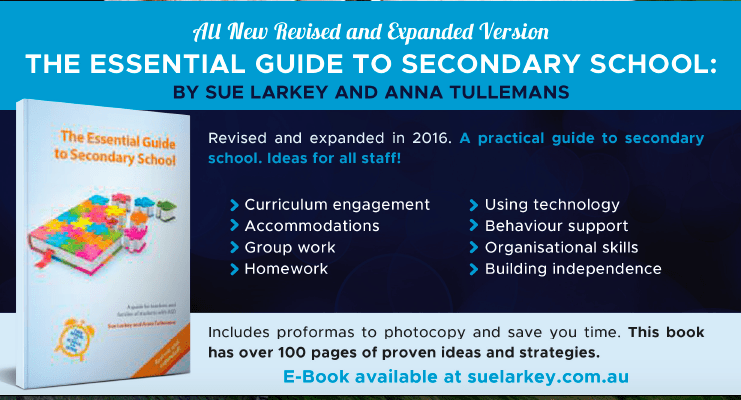QUICK RESULTS IN SECONDARY SCHOOL FOR STUDENTS WITH AUTISM
6 KEY STRATEGIES
Strategies have been taken from The Essential Guide to Secondary School By Sue Larkey and Anna Tullemans
In my experience one of the biggest challenges for staff and students with autism is the number of staff involved with the student compared to primary school. Staff should endeavour to share what works and problem solve with the whole team. Reinforcement across all settings will build competence faster and will result in more success for staff and students.
All of this information is still easy to implement when we are learning from home. Teachers I know it is challenging teaching online but I really think all of these strategies can be applied over Zoom, Microsoft Teams, FaceTime etc
- Think of each student as an individual. Support the age appropriate interests* and raise expectations towards independence and peer level behaviour as much as possible. (See book pages 5 and 6).
- Help the student build skills and independence. Nominate the behaviours/skills working on each week. Building competencies requires patience, setting priorities and establishing small goals to reach the desired outcome. (See book pages 14 and 16).
- Understand where the student is at and problem solve what is impeding their progress. Then develop the teachable, scaffolding steps that will help them move forward. (See book pages 26, 39, 40 and 68)
- Motivate to success. Know what motivates a particular student. Knowing that this may be different to other typically developing students. Use this interest to focus on attention on less interesting or non-preferred activities. (See book page 73)
- Effort Expected = Reward Offered. Ensure that the reward is substantial enough for the student to want to extend their effort. As a student becomes more familiar and more competent with new skills, their confidence, interest and motivation will increase and the need for rewards will decrease. Unfortunately for many of these students we need to use substantial rewards to engage them, as unlike their peers, intrinsic rewards are often irrelevant. (See book page 73)
- Small Steps of Success = Big Steps Forward. Shape behaviour by making small changes at a time and utilise reinforcement strategies, social (praise) as well as concrete (favourite activity). The reinforcement needs to have more value than the behaviour. (See book page 95)
*Age Appropriate Interests: sometimes you need to replace earlier interests with new ones which can help build relationships with peers. Moving from Lego, to Minecraft, to computer games. Students need to be able to talk about the same topics as their peers. This is especially important in a mainstream classroom. The broadening of interests will encourage greater participation from others.



 Sorry we no longer ship items outside Australia. Please consider the digital versions of Sue’s Books –
Sorry we no longer ship items outside Australia. Please consider the digital versions of Sue’s Books – 